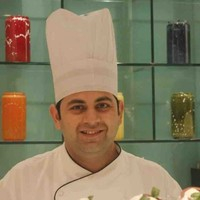Who's a Chef?
Do you enjoy food – especially experimenting with it? Do you like to throw in a bunch of ingredients and try to whip up something new? Does the idea of people eating the food you cook and enjoy themselves make you sizzle with excitement? If yes, consider becoming a chef!
As a chef, you’re going to have a lot of responsibilities on your plate, depending on where you work. Of course, a kitchen is your main workspace, but it could be a tiny commercial kitchen or a giant one capable of cooking up meals for thousands! Your day-to-day work would include cooking various dishes from your menu and working on new recipes to keep the excitement growing.
What will you do?
Discover your Ideal future
Get expert guidance and mentorship towards your perfect fit.
Where will you work?
How do you get there?
What skills would you need?
How do you make it to the top ranks?
Intern
You would be working in different departments, handling simple tasks such as peeling off vegetables, washing them, etc. You would be guided about basic kitchen maintenance habits, preparation of a variety of dishes and how to create innovative menu ideas. You would also have to assist other chefs in food preparation to ensure all the orders undertaken are completed efficiently.
Commis
This is an entry-level stage. Here, you would be involved with a lot of basic tasks. These could range from peeling and chopping onions to cutting and processing vegetables, and getting all the pre-preps or the mise-en-place (getting the kitchen ready before you cook) ready.
You will also be taught how to set up and plan for busy periods, maintain hygiene and sanitation, and work in collaboration. This stage lasts from one to three years and can get a little overwhelming and repetitive. However, your passion for cooking will help get you through.
Line cook
You would oversee one section of the kitchen i.e. preparation of one type of cuisine. For example, you would be responsible for cooking Chinese or just whipping up desserts. You would be guided by other chefs who specialise in preparing that particular cuisine. Alongside cooking, you would also have to ensure the overall cleanliness of the kitchen. At this level, you would be cooking simple dishes and assisting senior chefs with different work in the kitchen.
Sous chef
This is a senior level position that requires you to take charge of the kitchen. You would oversee the day to day running of the kitchen and manage the kitchen inventory and stock. You would also play a significant role in planning the menu and training the line cooks and interns.
Executive chef
At this level, you would be in complete charge of the kitchen and your primary job would be to ensure that all the dishes are cooked and prepared as per the set standards. You would play a huge role in planning menus, supervising staff, managing the budget and ensuring the success of the restaurant. You would also lead the team of chefs as a whole and would also have to interact with customers from time to time.
Thinking of a career as a Chef? Take the Mentoria assessment test & talk to our career counsellors to get personalized step-by-step guidance for your future career path.
Pursuing your career locally VS overseas
The food industry all over the globe is growing and this can be seen in India as well. The trend of eating out has become quite popular and has resulted in many chefs starting their own restaurants or food delivery services. If you study culinary in India, it becomes easier for you to build a network and understand the market here. With a lot of new restaurants setting up, there is a huge demand for chefs in India. Additionally, studying culinary in India would help you understand the likes and dislikes of people here and would help you set up your own restaurant.
You can opt to do a course in culinary arts from top Indian colleges such as Culinary Academy of India, International Institute of Culinary Arts, College of Hospitality and Tourism (New Delhi), etc. Opt to do a Bachelor’s in the field from top hotel management institutes in India. Studying culinary in India would cost you an average of INR 75,000-INR 5,00,000 depending on the institute you opt for. The duration of these courses mostly ranges from three to four years. Alternatively, you can also join culinary classes in your vicinity.
If you wish to do a culinary course outside the country, then you can always look for job opportunities in the country you are studying in. There are many culinary schools abroad that offer you specialisations in different cuisines. Studying culinary abroad introduces you to global cuisines and gives you a chance to build a good network with people from all over the world. These courses also offer you advanced training and education that help you excel in the field. However, you must note that most culinary programmes abroad require you to have a certain amount of experience before you enrol with them. A culinary course abroad would cost you anywhere between INR 5,00,000-25,00,000 depending on the university you want to get into. The duration of the culinary course abroad is usually one to four years.
How much would you get paid?
The exact number will depend on where you’re working, your education, skill-set and internship experience. But we can give you a general idea.
What are your career options?
#CAREERREADY QUIZ
Think you know everything there is to know about this career?
Take the quiz to test your knowledge and find out how #CareerReady you are!
You got 1out of10right!
Discover your Ideal future
Get expert guidance and mentorship towards your perfect fit.












